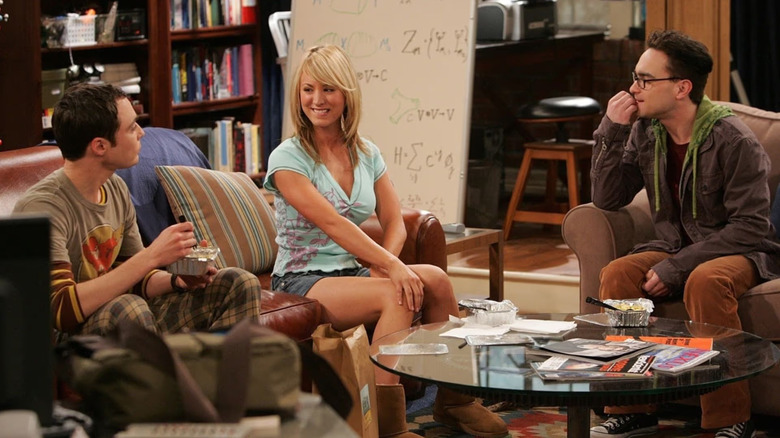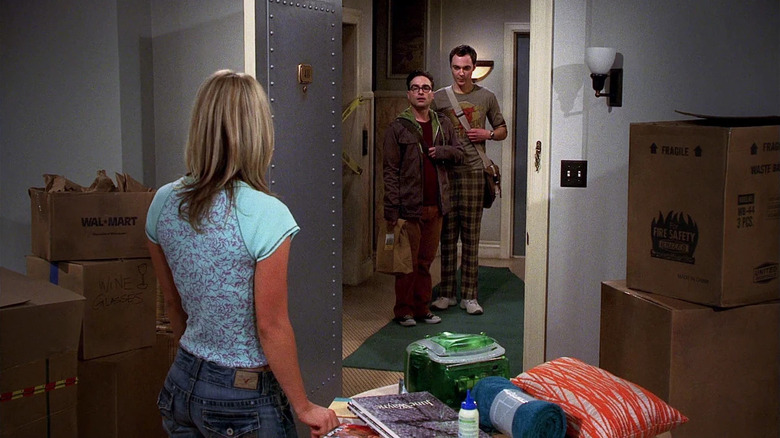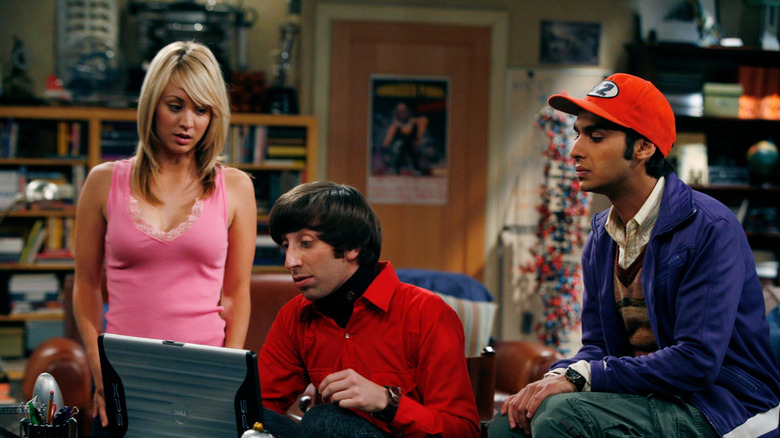It's 2025 And I Just Watched The Big Bang Theory Pilot For The First Time - Here Are My Honest Thoughts
My partner is one of those people who finds a show she likes and just blasts through episodes back-to-back, season after season, watching little else until it's done. It drives me up the wall at times because I'm more of a movie guy. I'll look at a season of 10 one-hour episodes where we still don't know the outcome (and might never if the show gets canceled) and see it as a missed opportunity to watch five films where I'll actually find out what happens in the end. But it even took my partner a very long time to crack through all 12 seasons of "The Big Bang Theory," which meant there was a never-ending stretch when the show was just always on when we were at home together.
The episodes all started to run together after a while, but I definitely didn't hate it the way a lot of people out there seem to. I guess we dropped in sometime around season 2 or 3, and I got a cozy feeling from the old-school format with the laugh track and the familiar set-up of flatmates and neighbors living across the hall. It struck me as a show that got more high on its own supply the longer it ran and the more successful it got, just like many other wildly popular shows tend to after a while. As a result, I found the characters increasingly insufferable, especially Sheldon; I also got the sense that Jim Parsons was becoming ever aware of his stardom and was milking the hell out of his shtick. So, I tuned out and did something else whenever my partner was churning through the later seasons.
Skip forward a decade or so, and I thought I'd escaped "The Big Bang Theory," only for my kids (now 8 and 10) to get hooked on the "Young Sheldon" spin-off on Netflix. At first glance, I found it insufferable too, but I was mildly intrigued by how very different it looks from the original show, appearing more like a coming-of-age comedy-drama than a classic multi-camera sitcom filmed in front of a live audience. Somewhere, during one of the interminable episodes of the prequel show, it occurred to me that I didn't know how either series actually started. So, I trudged back to the pilot episode of "The Big Bang Theory" to see how it plays today. Here are my honest thoughts.
What happens in the Big Bang Theory pilot?
The "Big Bang Theory" pilot feels dated from the get-go. The writers' opening gambit introduces us to Sheldon Cooper (Jim Parsons) and Leonard Hofstadter (Johnny Galecki) as they are nervously visiting a sperm bank for donors with high IQs. I thought sperm bank gags went out in the 1990s; I recall Beavis and Butthead doing that whole bit, as well as Frank Drebin enjoying himself way too much filling cups in "Naked Gun 33 1/3: The Final Insult." Sheldon wonders how he will follow through with his contribution, while Leonard quips that he'll do just fine because he's "semi-pro." Shock horror! Rather than the comic disinterest in sexual matters that Sheldon displays later in the series, we find out right off the bat that he masturbates regularly. As such, Sheldon is slightly more "normal" here, even competing with Leonard for Penny's attention in the scenes that follow.
The boys do a runner from the clinic and the outmoded '90s vibe continues when they get back to their apartment building, which I always (incorrectly) assumed was a repurposed set from "Friends." Sheldon and Leonard find out they have a new neighbor, a young blonde woman unpacking her stuff as they ogle her from the hallway. The "Friends" thought made me realize how similar the two shows are, with Penny (Kaley Cuoco) functioning as the Rachel character and Leonard as the Ross equivalent. Leonard's reaction reveals that he is instantly smitten and much of the comic awkwardness in the rest of the episode comes from these two horny geeks getting flustered by a real live girl.
We get our first glimpse at the boys' implausibly large and plush apartment before Leonard invites Penny over for lunch, resulting in a comic highlight as Sheldon struggles to cope when she takes his spot on the couch. Then writing gets old-fashioned again, contriving a need for Penny to use the geeky friends' shower before we meet Howard (Simon Elberg) and Raj (Kunal Nayyar) for the first time. The episode closes out as Penny asks Sheldon and Leonard to retrieve her TV set from her mean jock ex-boyfriend, but they return without pants instead. It's clearly supposed to be a hilarious crescendo, but it's a little too rushed and underplayed to fully pay off. And that's about it, a ho-hum pilot almost remarkable in its devotion to hackneyed sitcom beats.
The Big Bang Theory goes hard with the stereotypes and feels dated as a result
The pilot episode of "The Big Bang Theory" is amusing but nowhere near as hilarious as the studio audience seems to think; I pictured someone with an electric cattle prod stalking the aisles to make sure everybody laughed with appropriate gusto. There is certainly little to suggest why the show would become so absurdly popular, but then again, a lot of series take a few episodes to really settle into the groove. Nevertheless, it does a pretty efficient job of introducing five main characters in just 22 minutes: Sheldon has trouble picking up on social cues and gets hung up on tiny details, Leonard is marginally more street-smart but can't help following Sheldon down rabbit holes, Howard is a comically sleazy wannabe ladies' man, and Raj is so shy he can't talk to a woman. They are a collection of nerd clichés, but ones played with conviction by the actors. Penny fares worse as the pilot doesn't do right by Kaley Cuoco. The "Big Bang Theory" showrunners would eventually develop her character more, but she is lumbered with a formulaic role as a dizzy blonde here.
"The Big Bang Theory" generally gets a bad rap for its negative stereotypes. Indeed, I've always found an odd disconnect between the way we are meant to invest ourselves in the male characters' quirks and struggles with social anxiety while simultaneously being invited to laugh at their nerdy habits and hobbies. The pilot goes all in on this, with references to "Battlestar Galactica," "Star Trek," and "Star Wars" played as punchlines, and there is also a strain of anti-intellectualism as we are expected to find Sheldon and his friends laughable because they are so smart.
That may be why the show has such an anachronistic feel. "The Big Bang Theory" first aired in 2007, back when geek culture was beginning to dominate the mainstream rather than being something that hopeless dweebs obsessed over in their mom's basement. It's amazing to think that more on-the-pulse series like "It's Always Sunny in Philadelphia" and "Arrested Development" started earlier and still feel fresher today. I came out of the pilot episode in the same position as I was before: mildly entertained and not hating it at all, but still unable to figure out why it was the biggest sitcom in the world less than a decade ago.


